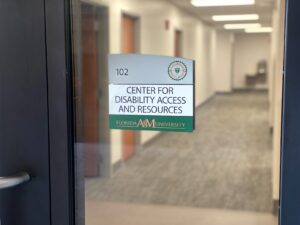
With many businesses and universities still recommending wearing masks to fight against COVID, hearing-impaired students have to cope and adjust with the mask recommendations.
Face masks reduce the amplitude of sound and cause it to become somewhat garbled, cutting off one form of communication for those individuals. Speech reading, also known as lip reading, is another way of communicating for hearing-impaired individuals — alongside sign language. Masks make lip reading impossible.
Kayla Iszard, a student at Florida A&M, deals with frustration when she forgets to turn on her hearing aid.
“It’s frustrating when people walk up to me and just assume I can hear and understand them when their mask is on, words sound muffled, and reading lips is difficult when a mask is covering their lips,” Iszard said.
Sometimes, people realize she isn’t able to hear, so they slightly pull down their mask and start reiterating their words, allowing Iszard to read their lips.
Appreciating the gesture of pulling down their mask, she feels frustrated because this puts people at risk of catching COVID for a quick moment. The Center for Disability Access and Resources (CeDAR) at Florida A&M University provides academic support to students who identify with a disability.
More than 800 students are registered with CeDAR. They are provided with academic accommodations including extra time on tests and quizzes and alternate test sites for those who need fewer distractions. Other services include recorded lectures, copies of power points, reserved seating accessible for them, all based on what CeDAR students’ disabilities are and how it impacts them.
Deborah Sullivan, CeDAR’s director, said professors help accommodate hearing-impaired students with the requirements of the face masks on campus.
“For my students that are hearing impaired, some of the things that have been beneficial for them are face-to-face classes,” Sullivan said. “If the professor can stand behind plexiglass for the professor to feel comfortable removing their mask for the students to read their lips.”
Zoom classes are another alternative for hearing impaired students. Closed captions are an option for the students to read while in class. Clear face masks are another option.
Knowing face masks are a problem for hearing impaired students, these accommodations can help make communication with them smoother. For more information, you can visit the CeDAR office in the Center for Access and Student Success building at 667 Ardelia Court.